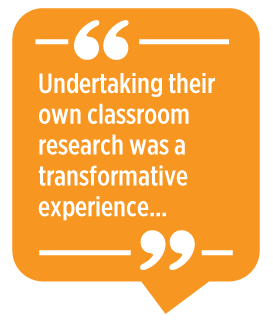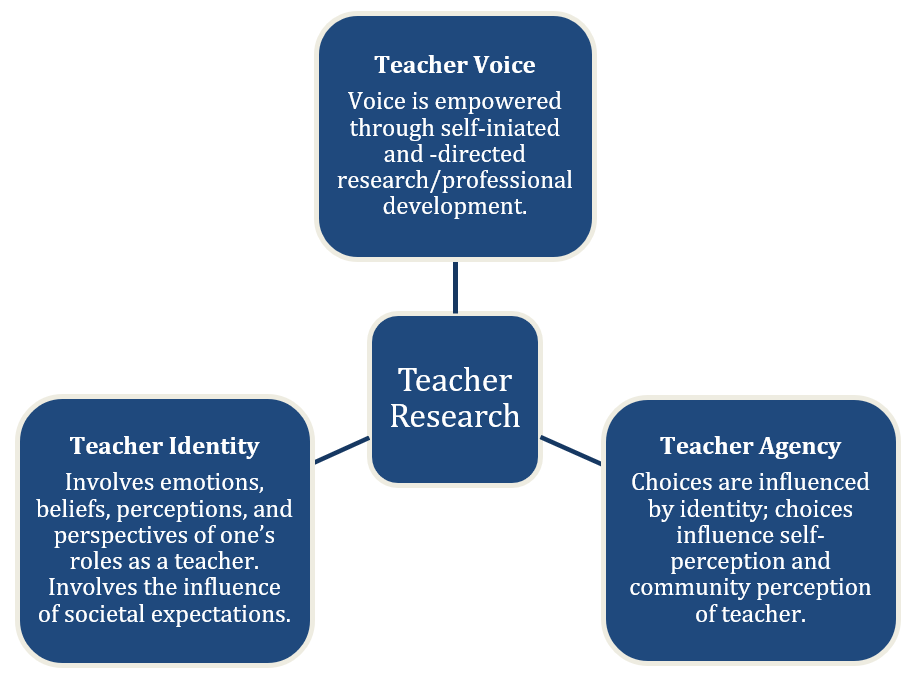Teacher Research: Empowering Teachers To Empower Students
by Sonia Rocca
 Blending reflective practice with systematic
inquiry, teacher researchers put their students in the spotlight and treat
their work as a meaningful data-informed way to understand student learning
beyond standardized tests’ results. Teacher research is student centered and
fosters empathic student-teacher relationships, because teachers feel more
connected to their students and students feel more valued by their teachers.
Blending reflective practice with systematic
inquiry, teacher researchers put their students in the spotlight and treat
their work as a meaningful data-informed way to understand student learning
beyond standardized tests’ results. Teacher research is student centered and
fosters empathic student-teacher relationships, because teachers feel more
connected to their students and students feel more valued by their teachers.
According to an Australian study (Edwards &
Burns, 2016), English language teachers who completed an action research course
as part of their professional development reported its considerable impact on
their teaching, their relationship with students, their motivation for
research, and their recognition from their professional communities.
Undertaking their own classroom research was a transformative experience for
these teachers, as they felt more confident about their teaching and more
connected to their students. They also felt more valued by their schools and
their sector. Whether or not they continued to be engaged with action research,
they developed a research ethos that has guided them in their professional
growth.
 Yet, despite all these benefits and more, teacher
research faces challenges. It may be perceived as an additional burden, and,
furthermore, teachers might think that research is for academics. For teacher
research to have a sustainable impact, it needs to be encouraged, mentored, and
incentivized. In this article, I discuss how teacher research contributes to
the development of teacher identity, agency, and voice. I also make a case for
mentoring teachers to cultivate a research mindset, emphasizing the importance
of supporting teacher research institutionally and beyond.
Yet, despite all these benefits and more, teacher
research faces challenges. It may be perceived as an additional burden, and,
furthermore, teachers might think that research is for academics. For teacher
research to have a sustainable impact, it needs to be encouraged, mentored, and
incentivized. In this article, I discuss how teacher research contributes to
the development of teacher identity, agency, and voice. I also make a case for
mentoring teachers to cultivate a research mindset, emphasizing the importance
of supporting teacher research institutionally and beyond.
Teacher Identity, Agency, and Voice Are Interrelated
Teacher
Identity
Teacher identity is a multifaceted construct that
changes over time and across contexts. Its definition is complex, lying at the
crossroads of several disciplines—education, philosophy, psychology, sociology,
and anthropology. Barkhuizen (2017) defines language teacher identities as
“both inside the teacher and outside in the social, material and technological
world” (p. 4).
Teacher
Agency
Teacher agency is pivotal to the development of
teacher identity. The roles one fulfills as a teacher align with what one does
and how one acts as a teacher.
Teacher
Voice
Teacher voice relates to teacher identity and
agency in terms of the “who I am” as a teacher, the “what I do” as a teacher,
and the degree to which a teacher’s perspectives and experiences are shared and
valued. As they take on the role of researchers, the agency they show helps
shape their professional identity. (See Figure 1.)

Figure 1. Interconnection of teacher identity,
voice, and agency as a result of teacher research. (Click here to enlarge.)
I have been a teacher-researcher for as long as I
can remember. I have always been interested in investigating what goes on in my
classrooms. This is the cornerstone of my professional identity. In 2012, my
sixth-grade class was involved in a 1:1 iPad pilot program. I designed a study
to test the effectiveness of such a program (agency). Not only did I share my
findings with colleagues, parents, and administrators, I also presented at international
conferences and published them in a refereed journal (voice). This whole
experience impacted not only my pedagogical practices, but also, importantly,
the way I see myself and present myself as a teacher (identity).
Mentoring Teacher Researchers
I am one of those teachers who merge teaching with
research, embedding inquiry into daily classroom practices and treating student
work as a constant source of data. In my constructivist approach to education,
I espouse Dewey’s (1933) view that inquiry is central to education. Inquiry is
propelled by reflective thinking, and “reflection includes observation” (p.
102), making it part of a scientific approach, where data represents observed
facts (p. 104).
An Important Distinction: Teacher
Research vs. Action Research
My experience as a teacher researcher has made me
appreciate what an endeavor it is to undertake classroom research. Where and
how to begin is always an issue. The idea of conducting action research can be
particularly anxiety-inducing because it focuses on implementing change. But
not all teacher research is action research. In fact, teacher research that is
exploratory research could be a good starting point.
Getting
Started
Smith (2020) recommends teachers start by
reflecting on a success, a problem, or a puzzle by sharing their recent
experiences with other colleagues or writing them down in a journal. Teacher
journals come in many different shapes and forms. The internet is a cornucopia
of such resources: teacher journal templates, ideas prompts, examples,
notebooks. A personal favorite is the Notes app:
I use it to jot down my thoughts, take photos or videos of my students’ work,
and record my observations. Writing journal entries is the stock-in-trade of
the typical reflective practitioner. It helps with monitoring practices,
sampling student work, scrutinizing patterns, and developing a research focus.
However, unless a teacher has a solid background in research methodology,
moving from reflective practice to systematic inquiry could be a daunting
endeavor.

Teacher Research
Mentors
This is where a research mentor comes in handy. A
mentor does not judge or tell you what to do, but rather encourages you to find
your own way. Mentors build on confidence and confidentiality to provide support
throughout the process, as mentees evolve from reflective practitioners to
teacher researchers. Mentoring helps structure reflective practice, which is a
common part of many educators’ teaching and is often included in teacher
evaluations, steering it toward systematic inquiry.
Mentors provide guidance in designing a research
methodology, from formulating research questions to collecting data and
analyzing them, using strategies like the following:
- dialog journals
-
classroom observations
-
Socratic questioning
-
scaffolding activities
-
interactive workshops
Mentors also assist with sharing findings through
presentations and publications. Smith (2020) is an excellent resource for
mentors, with practical guidelines based on the extensive experience of the
author as a research mentor and a coordinator of research mentoring
programs.
Incentivizing Teacher Researchers
Teacher research requires a considerable investment
of time and effort. It hinges on teacher agency and, hence, on the choice of
the individual teacher to engage in this type of professional growth. As such,
teacher research should be promoted but not mandated; it is important, too, for
teachers to see tangible signs of institutional support. Here are a few ways
institutions can incentivize teacher research within their staff:
-
Recruit “resident mentors” as part of your
professional development offerings. This could be a powerful motivator as
mentors advocate and pave the way for teacher research.
-
Provide opportunities for promotion for teacher
researchers.
-
Allot time for teacher research in professional
development credit hours or in a workload schedule.
-
School districts could organize action research
courses.
Promoting teacher research needn’t be limited to
institutions; professional organizations could offer grants to encourage
teachers to attend action research courses, as well as to present at
conferences and write for publication. The British Council has successfully
implemented “Action
Research Mentoring Schemes” in Latin America and South Asia.
In the End: Cui Bono?
All stakeholders benefit from teacher
research—teachers, students, parents, and administrators—and benefits stem from
both the process and the outcome. During classroom research, teachers build evidence-based
knowledge that informs their practices and refines their expertise, and they
become more attuned to student perspectives. Students feel their output is
important because it becomes input for a teacher researcher’s investigation.
All of this (the new knowledge, refined expertise, and improved student
self-perception) impacts the classroom environment and student learning, and it
can also impact policy making and curricular decisions. In Suskind’s (2016)
words, “teacher researchers are innovators, curriculum drivers, agents of
school change, and directors of their own professional development.”
References
Barkhuizen, G. (2017). Language teacher identity
research: An introduction. In G. Barkhuizen (Ed.), Reflections on
language teacher identity research (pp. 1–11). Routledge.
Dewey, J. (1933). How we think, a
restatement of the relation of reflective thinking to the educative
process. Heath.
Edwards, E. & Burns, A. (2016). Language
teacher action research: Achieving sustainability. ELT Journal,
70(1), 6–15. https://doi.org/10.1093/elt/ccv060
Smith, R. (2020). Mentoring teachers to
research their classrooms: A practical guide. British Council. https://www.teachingenglish.org.uk/sites/teacheng/files/Mentoring_Teachers_Research_classrooms_handbook.pdf
Suskind, D. (2016, January 26). Teacher
as researcher: The ultimate professional development. Edutopia. https://www.edutopia.org/blog/reacher-researcher-ultimate-professional-development-dorothy-suskind
Sonia
Rocca is a Fulbright Global Scholar and an
English language specialist with the U.S. Department of State. She holds a PhD
in applied linguistics from University of Edinburgh and has been a language
educator for 30 years, teaching three different languages (English, French,
Italian) in three different countries (Italy, Britain, United States).
Currently, she teaches Italian at the Lycée Français de New York. Last year,
she launched a teacher research mentorship program at her
school.